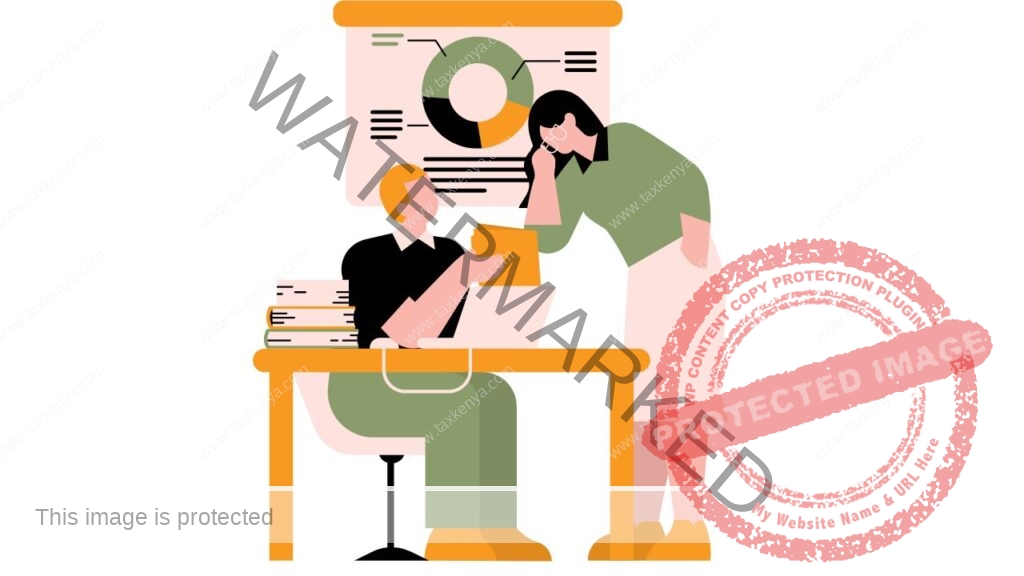Successful business ownership requires good money management, especially Accounts Receivable. Financial planning must include the management of accounts receivables. Increasing accounts receivables may improve your cash flow and attract new clients.
a. Affiliate Disclosure: These are affiliate links from which we receive a commission at no cost. Read full Affiliate marketing disclosure HERE.
b. Tax Contents Disclaimer: The tax industry in Kenya is very dynamic. The tax contents in the posts are not professional advice. Read full disclosure HERE.
However, accounts receivables present challenges to any business. This article will explore the effects of accounts receivable and how to handle them effectively to safeguard your business’s financial security and foster growth.
What is 'Accounts Receivable'
Accounts Receivable (AR) is the money customers or clients owe a business for goods or services sold on credit. AR represents a crucial aspect of a company’s financial health, indicating the cash flow a business can expect to receive shortly.
Accounts receivables are from credit sales. Are there any benefits of having accounts receivables?
Seven Benefits of Accounts Receivables
There are many benefits of having accounts receivables. The following are seven benefits of accounts receivables to a business.
1. Improved cash flow:
Accounts receivable are amounts customers owe for goods or services sold and delivered on credit. Collecting accounts receivable can improve cash flows and help the business meet financial obligations, such as paying bills or investing in new opportunities.
2. Sales growth:
Allowing customers to pay over time and extending credit can increase sales and new customers or clients. This is because some customers may be willing to pay later for the goods or services rather than upfront.
3. Customer loyalty:
A business can enhance customer or client loyalty by giving customers credit and offering flexible payment options. This is because some customers or clients like having the choice to pay over time. Once they get goods or services on credit, they might be more willing to work with your business.
4. Better money management:
Keeping an eye on accounts receivables will enable any business to manage its finances skillfully and come to more informed judgments. For example, by monitoring the maturity of accounts receivables, a business can identify any receivables past the due dates and take the necessary actions to seek payment.
Accounts receivables are an asset on the balance sheet. Increasing the value of accounts receivables will boost the value of the business to lenders and investors. This is because accounts receivable are a sign of expected cash flows, which may be used to pay off debts or invest in new projects.
5. Flexibility:
A business with accounts receivable has more freedom to manage its finances. The business can choose, for instance, to exclusively provide credit to specific clients or particular transactions according to the needs and goals of the business.
A business can gain insight into customers’ or clients’ behaviour by monitoring the accounts receivable, which can inform about payment preferences and patterns—for example, differentiating customers or clients who consistently pay on time and those who are more likely to pay late or not. This information can help the business decisions about getting loans, setting up payment plans, and managing cash flows.
There are many benefits of accounts receivables. Are there any problems with accounts receivable to a business?
Eight Problems with Accounts Receivables
Though there are benefits of accounts receivables to a business, there are problems. Some of the issues can wipe out the business. The following are some of the difficulties of accounts receivables.
1. Potential for bad debt:
The major problem presented by accounts receivable to any business is the potential for bad debt. This occurs when a customer or clients cannot pay their unpaid debts. This may result in revenue loss for the business.
2. Payment delays:
Accounts receivable reflect the debt owed to the business. The debt could take some time for it to be settled. This may cause a delay in getting the money needed to invest in new opportunities or pay the business debts.
3. Administrative costs:
Dealing with accounts receivable can be costly. Sometimes the business may take administrative actions to recover the debt. The actions may require the use of resources, such as billing.
4. Tracking payments:
Pursuing past-due clients can be labour- and time-intensive. This could result in higher costs for your business.
5. Reduced cash flow:
Accounts receivable can boost your cash flow, but if too much of revenue is in unpaid invoices, it can have the opposite effect and reduce cash flows.
6. Credit score:
Past-due receivables might hurt a business’s credit score. This can make obtaining financing or bringing new customers into the business demanding.
7. Time and effort:
Dealing with accounts receivables may require time and effort, especially when dealing with international transactions. Due to linguistic barriers, legislation, and differences in currency exchange rates, collecting international payments can take time and effort. This challenge could be made more difficult if your clients are headquartered overseas.
8. Customer relationships:
Aggressive collection of accounts receivable may hurt customer or client relationships. Consumers or clients may experience pressure or intimidation to pay the unpaid balance, resulting in resentment or loss of trust.
We have explored the benefits and problems of accounts receivables. The question is: are there opportunities to make money with accounts receivables?

How to Make Money with Accounts Receivables
Accounts receivables are assets. Any asset should be able to generate money for the business. A semi-industry and creation of assets and services have developed from accounts receivables. The following are some ways to make money with accounts receivables.
1. Factoring:
Factoring is an activity where a business owner with accounts receivables approaches a third party for money. The third-party can wait for the payment but will give the business owner money. The business will give the third party a discount on the accounts receivables.
This allows the business to acquire cash immediately rather than wait for the customer or client to pay. Although you might receive less money upfront, it will help the business improve cash flow and avoid writing off bad debt.
2. Invoice finance:
This is similar to factoring in that it uses accounts receivable as collateral for a loan rather than selling them. A business can repay a loan against a portion of the outstanding invoices once the customer pays the balance. This can help a business control accounts receivables while giving the business quick access to money.
3. Early payment discounts:
By offering early payment discounts to customers or clients, a business can persuade them to pay their invoices faster, improving cash flow. For instance, if the invoice is paid within fifteen days instead of the typical 60 days, the business can offer a 5% discount.
3. Agency for collections:
If a business has unpaid debts, a collections agency can assist in collecting the debt. Although there will be a fee, the agency can help the business to recover all or some of the funds that would otherwise be lost. Also, it might free up business time and resources to focus on other organisational areas.
5. E-invoicing:
The traditional process of invoicing has often resulted in accounts receivables. Electronic invoicing or e-invoicing emerged from the delays in invoicing, resulting in the accumulation of accounts receivables.
The payment process can be sped up with e-invoicing, and administrative costs can be reduced. Sending the invoice to the customer or client electronically will reduce the time to receive and process the invoices. E-invoicing can reduce errors and increase the transparency of the payment process.
6. Securitisation:
This is grouping accounts receivables into a portfolio and selling it to investors as a security. The business may receive a lump sum payment upfront and transfer the risk of nonpayment to the investors. Unfortunately, this activity is only available to large companies with multiple accounts receivables.
7. Exchange for receivables:
An exchange for receivables is a market where businesses can sell their accounts receivable to investors. This gives investors a new investment asset and makes money quickly. Receivables exchanges offer competitive rates and prices compared to traditional factoring or securitisation. It is essential to thoroughly research the exchange and evaluate its position and dependability before participating.
Even though making money with accounts receivables is contentious, assessing the benefits and drawbacks is essential before deciding to take action. Businesses should evaluate their financial status and weigh the potential costs and benefits before deciding whether any action is appropriate for their specific financial circumstances.
The sources of accounts receivables are credit sales. Business sales are the basis of most tax types. What is the relationship between tax and accounts receivables?
Relationship between Taxes and Accounts Receivables
Income from accounts receivable is taxable income (with exemptions) regardless of whether a payment has been made; taxes and accounts receivable are closely related concepts. Accounts receivable may help businesses financially in the short term by allowing them to extend credit to customers, but the requirement to declare the unreceived income might cause tax issues.
The financial health of a business can also be negatively impacted by overdue accounts receivable, which can make it harder to pay taxes on time and result in penalties and interest charges.
On the other hand, using accounts receivables to obtain fast cash can also provide tax benefits by increasing sales, avoiding bad debt and business growth. Businesses must carefully manage their receivables to balance the benefits to the bottom line with prospective tax obligations.
We now know the relationship between tax and accounts receivables. Are there any positive effects of accounts receivables on tax?
Six Positive Effects of Accounts Receivable on Taxes
There are many effects of accounts receivables on tax. The following are some of the positive effects of accounts receivables of tax.
1. Tax deductions for bad debt:
When businesses cannot collect their accounts receivables, they may be entitled to deduct the amount they write off as bad debt from their taxes. Their taxable income may be reduced. In some countries, the bad debts will be added back when establishing the tax due for the year of income.
2. Accelerate bad debt deductions:
Businesses can accelerate bad debt deductions in the year the debt becomes partially or uncollectible rather than waiting until the following year. Some countries have specified periods to declare accounts receivable as bad debts. For example, if a debt is not paid within three years, it is declared a bad debt and no longer an account receivable.
3. Cash basis accounting:
A business that uses cash basis accounting can better manage its taxable income by deferring the reporting of revenue from accounts receivable until they receive payment.
4, Deferred revenue:
A business may classify a payment as deferred revenue for goods or services supplied or rendered. If so, the tax liability may become due in the future delivery or rendering of the goods or services.
5. Tax deferral:
Businesses that use accounts receivable financing can receive fast cash for their receivables, enabling them to pay their taxes on time and avoid penalties and interest charges.
6. Capital gains tax:
A business may be entitled to deduct the loss from its capital gains tax if it sells its accounts receivable to a third party at a discount. This depends on the country.
Above are six potential positive effects of accounts receivable on taxes. Every coin has two sides. Are there any possible adverse effects of accounts receivable on taxes?

Seven Adverse Effects of Accounts Receivable on Taxes
The following are some of the adverse effects of accounts receivables in taxes.
1. Revenue recognition:
Businesses may be required to pay taxes when they report income from accounts receivable, even though they have yet to receive the money. This is especially in countries where tax is accrual based.
2. Reduced cash flow:
Taxes on unrealised accounts receivable revenue may impact a company’s available cash flow. The taxes have to be paid, and this will reduce the cash flow.
3. Bad debt deductions:
The tax deduction for that amount is limited if a company’s accounts receivable cannot be collected and must be written off as bad debts, resulting in a loss of potential tax advantages.
Although businesses can deduct bad debt from their taxes, they might only be able to recover some of their losses due to limited bad debt recovery.
4. Delinquent accounts:
These are accounts that are accounts receivables that are uncollectable. It may be challenging for a business to maintain a stable financial position and to make tax payments on time if it has a significant amount of past-due accounts receivable.
5. Penalties and interest:
Due to financial strain from past-due invoices, delinquent taxes may be subject to fines, penalties and interest charges.
6. Compliance issues:
In many countries, tax is due whether the business has been paid for the supplies. Failure to comply with tax laws owing to past-due account receivables may result in legal issues and add to the company’s financial burden.
Conclusion
Accounts receivable can improve cash flows while managing a business’s finances. Knowledge about the risks and negatives associated with accounts receivable, including the likelihood of bad debt, delayed payments, and administrative costs, is essential.
Considering how accounts receivable will affect a business’s taxes is critical. Taxes may be due when you record revenue from accounts receivable, even if you have not received the payment.
By employing best practices to manage accounts receivable, such as extending credit to trustworthy clients, providing clear payment terms, and periodically monitoring accounts receivables, a business can minimise these risks and maximise the benefits of having accounts receivable.
Finally, effective accounts receivable management can help businesses ensure tax compliance while preserving strong client relationships, improving financial status, and building long-term business success.
Thank you for reading the article.
Dr. Wakaguyu Wa Kiburi.
Grab a FREE Book!









